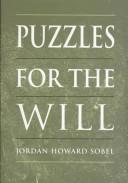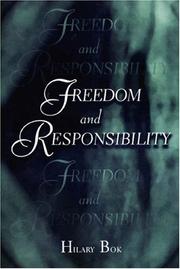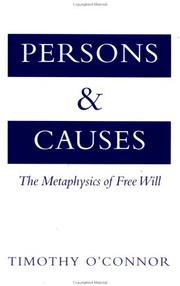| Listing 1 - 10 of 103 | << page >> |
Sort by
|

ISBN: 1282028464 9786612028465 1442678925 9781442678927 0802043267 9780802043269 Year: 1998 Publisher: Toronto, [Ontario] ; Buffalo, [New York] ; London, [England] : University of Toronto Press,
Abstract | Keywords | Export | Availability | Bookmark
 Loading...
Loading...Choose an application
- Reference Manager
- EndNote
- RefWorks (Direct export to RefWorks)
"Issues of free will and determinism, with their far-reaching practical implications, hold a central place in the history of philosophy. In this book Jordan Howard Sobel looks at the many and varied approaches to this complex topic."--BOOK JACKET. "Sobel considers some problems for decision-making that arise if we grant the possibility that someone may be able to predict reliably what another agent will freely choose. Sobel's careful analysis lays a solid foundation for the study of free will and will interest all who are concerned with fated, determined, and predicted choices and how philosophical reflection about these can puzzle the will."--Jacket
Free will and determinism. --- Compatibilism --- Determinism and free will --- Determinism and indeterminism --- Free agency --- Freedom and determinism --- Freedom of the will --- Indeterminism --- Liberty of the will --- Determinism (Philosophy)
Book
ISBN: 3110319535 9783110319538 9783110319163 3110319160 1299724442 Year: 2010 Publisher: Berlin De Gruyter
Abstract | Keywords | Export | Availability | Bookmark
 Loading...
Loading...Choose an application
- Reference Manager
- EndNote
- RefWorks (Direct export to RefWorks)
Few philosophical issues have had as long and elaborate a history as the problem of free will, which has been contested at every stage of the history of the subject. The present work practices an extensive bibliography of this elaborate literature, listing some five thousand items ranging from classical antiquity to the present.
Free will and determinism --- Compatibilism --- Determinism and free will --- Determinism and indeterminism --- Free agency --- Freedom and determinism --- Freedom of the will --- Indeterminism --- Liberty of the will --- Determinism (Philosophy)
Book
ISBN: 1498522394 9781498522397 9781498522380 1498522386 Year: 2015 Publisher: Lanham
Abstract | Keywords | Export | Availability | Bookmark
 Loading...
Loading...Choose an application
- Reference Manager
- EndNote
- RefWorks (Direct export to RefWorks)
Restorative Free Will examines free will as an adaptive capacity that evolved in humans and many other species, and restores free will to species excluded by claims of human uniqueness. Restorative Free Will recognizes the basic biological value of both libertarian and compatibilist elements of free will, and explains how these traditionally opposed accounts of free will capture an essential element of foraging animals' free will.
Free will and determinism. --- Compatibilism --- Determinism and free will --- Determinism and indeterminism --- Free agency --- Freedom and determinism --- Freedom of the will --- Indeterminism --- Liberty of the will --- Determinism (Philosophy)
Book
ISBN: 3030611361 3030611353 Year: 2021 Publisher: Cham, Switzerland : Springer,
Abstract | Keywords | Export | Availability | Bookmark
 Loading...
Loading...Choose an application
- Reference Manager
- EndNote
- RefWorks (Direct export to RefWorks)
Free will and determinism. --- Compatibilism --- Determinism and free will --- Determinism and indeterminism --- Free agency --- Freedom and determinism --- Freedom of the will --- Indeterminism --- Liberty of the will --- Determinism (Philosophy)
Book
ISBN: 1400867290 0691071691 9781400867295 Year: 1971 Publisher: [Princeton, N.J.]
Abstract | Keywords | Export | Availability | Bookmark
 Loading...
Loading...Choose an application
- Reference Manager
- EndNote
- RefWorks (Direct export to RefWorks)
Bernard Berofsky formulates a concept of determinism in terms that will be constructive for the continuing libertarian-determinist debate. His discussion will interest those who want a deeper understanding of this metaphysical doctrine, and anyone whose fundamental concern is with the nature of human responsibility and the possible threats to it posed by determinism.Originally published in 1971.The Princeton Legacy Library uses the latest print-on-demand technology to again make available previously out-of-print books from the distinguished backlist of Princeton University Press. These editions preserve the original texts of these important books while presenting them in durable paperback and hardcover editions. The goal of the Princeton Legacy Library is to vastly increase access to the rich scholarly heritage found in the thousands of books published by Princeton University Press since its founding in 1905.
Free will and determinism. --- History -- Philosophy. --- Philosophy. --- Free will and determinism --- Ethics --- Philosophy --- Philosophy & Religion --- Compatibilism --- Determinism and free will --- Determinism and indeterminism --- Free agency --- Freedom and determinism --- Freedom of the will --- Indeterminism --- Liberty of the will --- Determinism (Philosophy)

ISBN: 069101566X 9786612753558 1400822734 128275355X 1400811082 9781400811083 9780691015668 1400800781 1400800773 9781400800780 9781282753556 9781400822737 Year: 1998 Publisher: Princeton, N.J. : Princeton University Press,
Abstract | Keywords | Export | Availability | Bookmark
 Loading...
Loading...Choose an application
- Reference Manager
- EndNote
- RefWorks (Direct export to RefWorks)
Can we reconcile the idea that we are free and responsible agents with the idea that what we do is determined according to natural laws? For centuries, philosophers have tried in different ways to show that we can. Hilary Bok takes a fresh approach here, as she seeks to show that the two ideas are compatible by drawing on the distinction between practical and theoretical reasoning. Bok argues that when we engage in practical reasoning--the kind that involves asking "what should I do?" and sifting through alternatives to find the most justifiable course of action--we have reason to hold ourselves responsible for what we do. But when we engage in theoretical reasoning--searching for causal explanations of events--we have no reason to apply concepts like freedom and responsibility. Bok contends that libertarians' arguments against "compatibilist" justifications of moral responsibility fail because they describe human actions only from the standpoint of theoretical reasoning. To establish this claim, she examines which conceptions of freedom of the will and moral responsibility are relevant to practical reasoning and shows that these conceptions are not vulnerable to many objections that libertarians have directed against compatibilists. Bok concludes that the truth or falsity of the claim that we are free and responsible agents in the sense those conceptions spell out is ultimately independent of deterministic accounts of the causes of human actions. Clearly written and powerfully argued, Freedom and Responsibility is a major addition to current debate about some of philosophy's oldest and deepest questions.
Free will and determinism --- Responsibility --- Free will and determinism. --- Responsibility. --- Accountability --- Moral responsibility --- Obligation --- Compatibilism --- Determinism and free will --- Determinism and indeterminism --- Free agency --- Freedom and determinism --- Freedom of the will --- Indeterminism --- Liberty of the will --- Ethics --- Supererogation --- Determinism (Philosophy)

ISBN: 019515374X 0195133080 0199867089 9786610472970 0585363420 1280472979 0198030509 1423762975 9780585363424 9781423762973 9780195133080 0190288434 Year: 2000 Publisher: New York Oxford University Press
Abstract | Keywords | Export | Availability | Bookmark
 Loading...
Loading...Choose an application
- Reference Manager
- EndNote
- RefWorks (Direct export to RefWorks)
This title revisits the traditional explanation of freedom of will. O'Connor defines it as reason-guided agent causation and places his argument within a general metaphysics.
Philosophical anthropology --- General ethics --- Determinism (Philosophy). --- Free will and determinism. --- Free will and determinism --- Compatibilism --- Determinism and free will --- Determinism and indeterminism --- Free agency --- Freedom and determinism --- Freedom of the will --- Indeterminism --- Liberty of the will --- Determinism (Philosophy) --- Philosophy
Book
ISBN: 0262269775 1417560398 9780262269773 9781417560394 Year: 2004 Publisher: Cambridge, Mass. MIT Press
Abstract | Keywords | Export | Availability | Bookmark
 Loading...
Loading...Choose an application
- Reference Manager
- EndNote
- RefWorks (Direct export to RefWorks)
This collection of contemporary essays by prominent contemporary thinkers on the topics of determinism and free agency concentrates primarily on two areas: the compatibility problem and the metaphysics of moral responsibility. There are also essays on the related fields of determinism and action theory. The book is unique in that it contains up-to-date summaries of the life-work of five influential philosophers: John Earman, Ted Honderich, Keith Lehrer, Robert Kane, and Peter van Inwagen. There are also contributions by other familiar and distinguished authors, including Richard Feldman, John Martin Fischer, Carl Ginet, and John Perry, as well as important rising philosophers. While most of the articles are written from a Western, analytic perspective, the volume includes a paper that addresses Buddhist perspectives on freedom of the will. With an opening essay written by the editors--"Freedom and Determinism: A Framework"--that sets the terms of the discussion, the book provides a remarkably comprehensive set of articles that are of value to a wide audience, from students of philosophy to scholars.
Free will and determinism. --- Free will and determinism --- Philosophy --- Philosophy & Religion --- Ethics --- Compatibilism --- Determinism and free will --- Determinism and indeterminism --- Free agency --- Freedom and determinism --- Freedom of the will --- Indeterminism --- Liberty of the will --- Determinism (Philosophy) --- PHILOSOPHY/General
Book
ISBN: 0128052899 0128051531 9780128052891 9780128051535 Year: 2016 Publisher: Amsterdam, [Netherlands] : Elsevier,
Abstract | Keywords | Export | Availability | Bookmark
 Loading...
Loading...Choose an application
- Reference Manager
- EndNote
- RefWorks (Direct export to RefWorks)
"Making a Scientific Case for Conscious Agency and Free Will makes a series of arguments that certain human behaviors are impossible to explain in the absence of free will, and that free will emerges from materialistic processes of brain function. It outlines future directions for neuroscience studies that can harness emerging technologies and tools for systems-level analysis."--Page 4 of cover.
Free will and determinism --- History. --- Physiological aspects. --- Compatibilism --- Determinism and free will --- Determinism and indeterminism --- Free agency --- Freedom and determinism --- Freedom of the will --- Indeterminism --- Liberty of the will --- Determinism (Philosophy)
Book
ISBN: 1501726919 1501726927 1501726900 9781501726910 9781501726903 Year: 2018 Publisher: Cornell University Press
Abstract | Keywords | Export | Availability | Bookmark
 Loading...
Loading...Choose an application
- Reference Manager
- EndNote
- RefWorks (Direct export to RefWorks)
"I love life in its living form, life that's found on the street, in human conversations, shouts, and moans." So begins this speech delivered in Russian at Cornell University by Svetlana Alexievich, winner of the 2015 Nobel Prize in Literature. In poetic language, Alexievich traces the origins of her deeply affecting blend of journalism, oral history, and creative writing.Cornell Global Perspectives is an imprint of Cornell University's Mario Einaudi Center for International Studies. The works examine critical global challenges, often from an interdisciplinary perspective, and are intended for a non-specialist audience. The Distinguished Speaker Series presents edited transcripts of talks delivered at Cornell, both in the original language and in translation.
Free will and determinism. --- Compatibilism --- Determinism and free will --- Determinism and indeterminism --- Free agency --- Freedom and determinism --- Freedom of the will --- Indeterminism --- Liberty of the will --- Determinism (Philosophy) --- PHILOSOPHY --- Philosophy. --- Free Will & Determinism. --- Aleksievich, Svetlana, --- Mental philosophy --- Humanities
| Listing 1 - 10 of 103 | << page >> |
Sort by
|

 Search
Search Feedback
Feedback About UniCat
About UniCat  Help
Help News
News